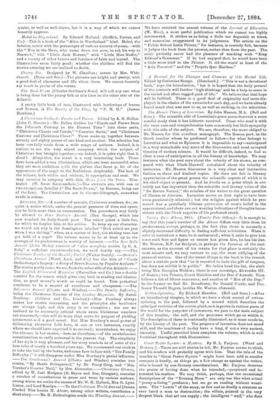careful study than it has hitherto received. Those who read
it with the most care and comprehension have commonly but little sympathy with this side of the subject. We are, therefore, the more obliged to Mr. Masson for this excellent monograph. The Roman poet, as the Greek teacher whom he professed to follow—for what belongs to Lucretius and what to Epicurus it is impossible to say—anticipated in a very remarkable way some of the discoveries and most accepted theories of modern science. It would be difficult, indeed, to find so clear a case of anticipation in all the history of knowledge. We may instance what the poet says about the velocity of his atoms, as com- pared with what Clark-Maxwell calculated about the velocity of molecules. Mr. Masson discourses in a very clear and instructive fashion on these and kindred topics. He does not fail iu literary appreciation of the great poems the scientific aspects of which it is his chief object to present. And he dwells on a point which is cer- tainly not less important than the scientific and literary value of the " De Rernm Natnra," the relation of the writer to the great question of Theism or Atheism. Lucretius seems on first sight to have been even passionately atheistic ; but the religion against which he pro- tested was a peculiarly hideous perversion of man's belief in the supernatural, and there are not wanting indications of thoughts incon- sistent with the blank negative of his professed creed.


































 Previous page
Previous page